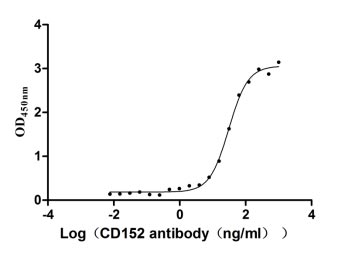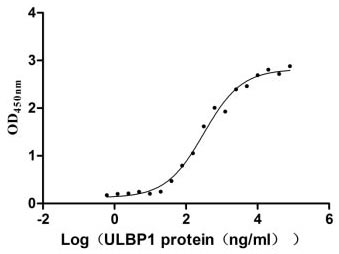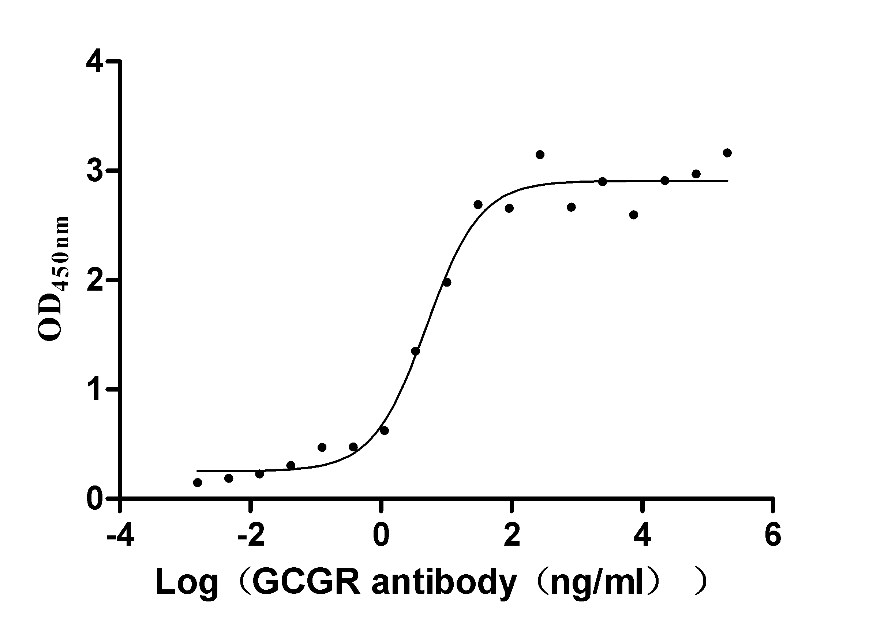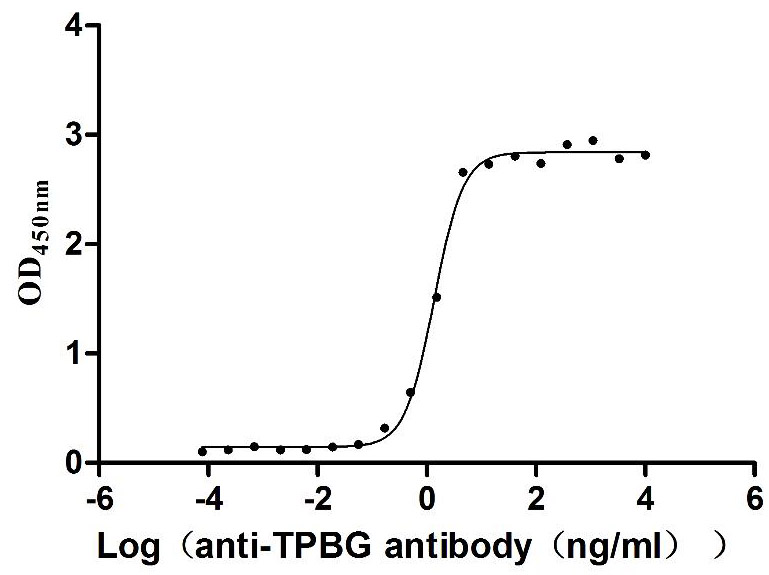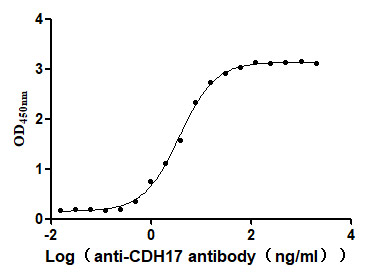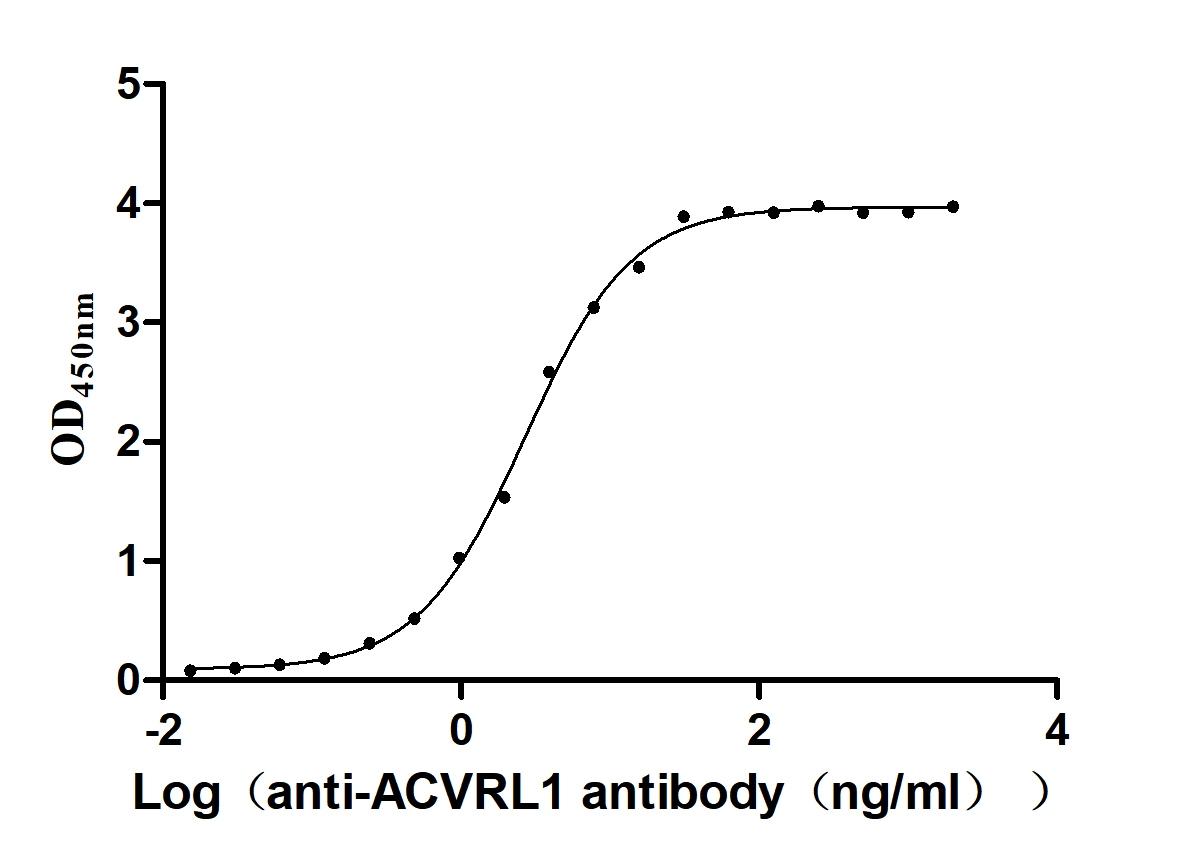Recombinant Mouse Heat shock protein beta-1 (Hspb1)
-
货号:CSB-YP010833MO
-
规格:
-
来源:Yeast
-
其他:
-
货号:CSB-EP010833MO
-
规格:
-
来源:E.coli
-
其他:
-
货号:CSB-EP010833MO-B
-
规格:
-
来源:E.coli
-
共轭:Avi-tag Biotinylated
E. coli biotin ligase (BirA) is highly specific in covalently attaching biotin to the 15 amino acid AviTag peptide. This recombinant protein was biotinylated in vivo by AviTag-BirA technology, which method is BriA catalyzes amide linkage between the biotin and the specific lysine of the AviTag.
-
其他:
-
货号:CSB-BP010833MO
-
规格:
-
来源:Baculovirus
-
其他:
-
货号:CSB-MP010833MO
-
规格:
-
来源:Mammalian cell
-
其他:
产品详情
-
纯度:>85% (SDS-PAGE)
-
基因名:
-
Uniprot No.:
-
别名:Hspb1; Hsp25; Hsp27; Heat shock protein beta-1; HspB1; Growth-related 25 kDa protein; Heat shock 25 kDa protein; HSP 25; Heat shock 27 kDa protein; HSP 27; p25
-
种属:Mus musculus (Mouse)
-
蛋白长度:Full length protein
-
表达区域:1-209
-
氨基酸序列MTERRVPFSL LRSPSWEPFR DWYPAHSRLF DQAFGVPRLP DEWSQWFSAA GWPGYVRPLP AATAEGPAAV TLAAPAFSRA LNRQLSSGVS EIRQTADRWR VSLDVNHFAP EELTVKTKEG VVEITGKHEE RQDEHGYISR CFTRKYTLPP GVDPTLVSSS LSPEGTLTVE APLPKAVTQS AEITIPVTFE ARAQIGGPEA GKSEQSGAK
-
蛋白标签:Tag type will be determined during the manufacturing process.
The tag type will be determined during production process. If you have specified tag type, please tell us and we will develop the specified tag preferentially. -
产品提供形式:Lyophilized powder
Note: We will preferentially ship the format that we have in stock, however, if you have any special requirement for the format, please remark your requirement when placing the order, we will prepare according to your demand. -
复溶:We recommend that this vial be briefly centrifuged prior to opening to bring the contents to the bottom. Please reconstitute protein in deionized sterile water to a concentration of 0.1-1.0 mg/mL.We recommend to add 5-50% of glycerol (final concentration) and aliquot for long-term storage at -20℃/-80℃. Our default final concentration of glycerol is 50%. Customers could use it as reference.
-
储存条件:Store at -20°C/-80°C upon receipt, aliquoting is necessary for mutiple use. Avoid repeated freeze-thaw cycles.
-
保质期:The shelf life is related to many factors, storage state, buffer ingredients, storage temperature and the stability of the protein itself.
Generally, the shelf life of liquid form is 6 months at -20°C/-80°C. The shelf life of lyophilized form is 12 months at -20°C/-80°C. -
货期:Delivery time may differ from different purchasing way or location, please kindly consult your local distributors for specific delivery time.Note: All of our proteins are default shipped with normal blue ice packs, if you request to ship with dry ice, please communicate with us in advance and extra fees will be charged.
-
注意事项:Repeated freezing and thawing is not recommended. Store working aliquots at 4°C for up to one week.
-
Datasheet :Please contact us to get it.
靶点详情
-
功能:Small heat shock protein which functions as a molecular chaperone probably maintaining denatured proteins in a folding-competent state. Plays a role in stress resistance and actin organization. Through its molecular chaperone activity may regulate numerous biological processes including the phosphorylation and the axonal transport of neurofilament proteins.
-
基因功能参考文献:
- HSP27 functions as a negative regulator in the PDGF-BB-stimulated migration of osteoblasts. PMID: 28902366
- HspB1 is recruited to sites of increased traction force in cells geometrically constrained on micropatterned substrates. Findings elucidate a molecular pathway by which a mechanical signal is transduced via activation of p38 MAPK to influence actin remodeling and cell migration via a zyxin-independent process. PMID: 28768826
- Study report a novel interaction between mutant HSPB1-P182L and the RNA binding protein PCBP1, leading to a reduction in its translational repression activity. Identifying PCBP1 mRNA targets revealed a marked prevalence for an RNA recognition motif, preferably seen in their 5' and 3'UTRs. Findings further support a role for mutant HSPB1 in neurodegenerative diseases. PMID: 28077174
- Expression of a phosphomimetic HSPB1 mutant in astrocytes reduced toxicity to motor neurons. PMID: 28797631
- AMPK-mediated HSPB1 expression enhanced insulin sensitivity in the skeletal muscle. PMID: 27928820
- e confirmed the modulatory effect of Hspb1 on Purkinje cell degeneration in vivo, as knockdown by Hspb1 shRNA significantly enhanced neuron loss. These results suggest that strategies to promote HSPB1 activity may slow the rate of cerebellar degeneration in NPC disease and highlight the use of bioinformatics tools to uncover pathways leading to neuronal protection in neurodegenerative disorders PMID: 27152617
- HSPB1 depletion in a mouse model of lung tumorigenesis induced the endothelial-to-mesenchymal transition PMID: 26744531
- Overexpression of HSP27-S135F protein causes peripheral neuropathy. The mouse model can be applied to future development of therapeutic strategies forhereditary motor neuropathy (dHMN) and Charcot-Marie-Tooth disease type 2 F. PMID: 26141737
- These results suggest that Sox2-Hspb1 signaling is a possible pathway responsible to tumor progression of QRsP-11 PMID: 26026081
- Rac1 participates in thermally induced expression of heat shock proteins in B16F10 melanoma cells PMID: 24586549
- These data suggest that in vivo MMP9-mediated processing of HSPB1 acts to regulate VEGF-induced endothelial cells activation for tumor progression, releasing anti-angiogenic HSPB1 fragments. PMID: 24465581
- a significant impairment in the rate of healing of wounds in hspB1-deficient mice PMID: 24143227
- Retinal HSP25 mRNA and protein expression was significantly increased in diabetic as compared to non-diabetic animals and localised within the retinal ganglion cells. PMID: 22068623
- the key contribution of HSPB1-VEGF interactions in the balance between physiological and pathological angiogenesis. PMID: 22350794
- Hsp25 plays an important role in regulating cardiac function during caffeine response PMID: 22140065
- The absolute amounts of HSP25 in extensor digitorum longus and soleus muscles are similar in both mouse and rat. PMID: 21975426
- Members of seven virus families modulate Hsp25 or Hsp27 expression in a variety of cell types, suggesting that Hsp25 participation in the antiviral response may be widespread. PMID: 20196617
- Data suggest that heat shock protein 25 plays a neuroprotective role in the flocculonodular region of the lurcher mutant mouse cerebellum. PMID: 20394049
- Heat shock protein 27 is upregulated in response to gastroduodenal reflux in BALB C mouse. PMID: 20304146
- Mechanism of downregulation of Akt activation in 6-mo streptozotocin diabetic kidneys was attributed to decreased Akt-heat shock protein (Hsp) 25, Akt-p38 interaction, and decreased PTEN activity. PMID: 19726550
- Overexpression of Hsp25 in K1735 murine melanoma cells enhances susceptibility to natural killer cytotoxicity. PMID: 11892982
- Heat-shock protein 25 (Hspb1) regulates manganese superoxide dismutase through activation of Nfkb (NF-kappaB). PMID: 12385642
- murine Hsp25 forms large complexes with nonnative proteins such as yeast Hsp26 PMID: 12637495
- The induction of hsp25 by IL-11 confers epithelial-specific cytoprotection that is independent of phosphorylation-dependent co-localization of hsp25 to F-actin, contributing to the protective effects of IL-11 in models of intestinal epithelial injury. PMID: 12730876
- HSP25 is involved in two steps of PAM212 keratinocyte differentiation PMID: 14662766
- reduced oxidative damage by HSP25 was due to MnSOD-mediated downregulation of ERK1/2 PMID: 14975446
- Results suggest that the level of expression of hepatic heat shock protein 25 may be a crucial determinant of the fate of mice exposed to acetaminophen insult. PMID: 15010265
- rapidly induced by Staphylococcus aureus enterotoxin b in intestinal epithelial cells, both directly and through lymphocyte activation PMID: 15155620
- Hsp27 expression and cell survival are regulated by the POU transcription factor Brn3a PMID: 15272315
- HSP25 may play a key role in regulating the glutathione system and resistance to reactive oxygen species in skeletal muscle cells. PMID: 15454285
- stathmin expression is disregulated, and Hsp25, Hsp27, and peroxiredoxin 6 are upregulated in a mouse model of familial amyotrophic lateral sclerosis PMID: 15509539
- Hsp27 protects against cytotoxic effects induced by oxidative stress in cultured mammalian cells PMID: 15649839
- cadmium-induced nephrotoxicity results, in part, from glomerular contraction due to p38 MAP kinase/HSP25 signaling-dependent contraction of mesangial cells PMID: 15687248
- Cysteine-141 regulates Hsp25 dimer formation. PMID: 15706091
- HSP25 binds to protein kinase C delta to inhibit its kinase activity and translocation to the membrane, which results in reduced cell death. PMID: 15731106
- Immunohistochemistry demonstrated that cerebellar maturation anterior to the CZ/PZ transverse boundary appears to be unaffected by the Lurcher allele, in that initial progression of Hsp25 expression in the Lc/+ cerebellum was similar to controls. PMID: 16127699
- Data show that conditioned media from Lactobacillus GG induce expression of heat shock protein (Hsp)25 and 72 in intestinal epithelial cells. PMID: 16306130
- Results suggest that heat shock protein Hsp25 is involved in more than one process during skin development. PMID: 16333981
- In summary, glutamine is an important amino acid, and its requirement for heat-induced Hsp25 supports a role for glutamine supplementation to optimize cellular responses to pathophysiological stress. PMID: 16554407
- The above results indicate that induction of adaptive response by hsp25 and inducible hsp70 is mediated by upregulation of p27Cip/Kip protein, resulting in low dose radiation-induced G1 arrest. PMID: 16571921
- HSP25 and HSP70i activate HSF1 and have roles in inhibition of ERK1/2 phosphorylation PMID: 16624816
- MK2-dependent insolubilization of Hsp25 oligomers has a role in susceptibility to cell stress PMID: 16840785
- Three species of Hsp25 are detected in ES cells, and this expression pattern changes during the first 24 h of differentiation until expression is decreased to levels that are barely detectable at 4 days following differentiation. PMID: 17030443
- These results indicate that HSP25 is a good candidate molecule to protect salivary gland from the toxicity of irradiation . PMID: 17071584
- heat shock protein 27-mediated resistance to DNA damaging agents is inhibited by a novel PKC delta-V5 heptapeptide PMID: 17616692
- Deletion of NFL markedly reduces degeneration and loss of motor neuron viability induced by S135F mutant HSPB1. PMID: 17881652
- the absence of interleukin-6 is associated with reduced skeletal muscle Hsp25 PMID: 18927263
- Each of the glutamic acid residues in the C-terminal extension is important for Hsp25 to act as an effective molecular chaperone. PMID: 19021764
- MAPK signals play important roles in incisor formation, differentiation, and development by mediating Hsp25 signaling. PMID: 19225803
- p38 MAP kinase and its downstream effector MK2 mediate lung permeability in ventilator associated lung injury by regulating HSP25 phosphorylation and actin cytoskeletal remodeling. PMID: 19240800
收起更多
-
亚细胞定位:Cytoplasm. Nucleus. Cytoplasm, cytoskeleton, spindle.
-
蛋白家族:Small heat shock protein (HSP20) family
-
数据库链接:
KEGG: mmu:15507
STRING: 10090.ENSMUSP00000005077
UniGene: Mm.13849


